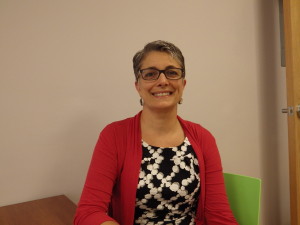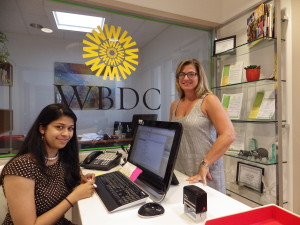Women’s work, 2013
The year 1972 hardly rings with the mustiness of olden days ”” two Apollo missions landed on the moon that year and San Antonio, Texas, hosted a smoky “Cheech and Chong Day.”
But in that year, it was impossible for a woman in her own name to get a mortgage, a credit card or a car loan. The male-dominated power structures could even forbid a woman from retaking her maiden name after divorce.
It was enough to make a person pine for 1872, 100 years earlier: “That was the year the federal government passed a law mandating equal pay for women and men doing the same work for the government,” said Fran Pastore, president and CEO of the Stamford-based Women”™s Business Development Council (WBDC). “We”™re still fighting the battle.”

That battle, with all its historic permutations and persecutions, eventually reveals its economic underpinnings. “If women have their own economic clout, everything is better,” Pastore said. “There is less domestic violence. There is less oppression. It does not matter if you”™re from Rwanda, Costa Rica, Afghanistan or the U.S., the issues are the same. The way out is through education and empowerment and teaching women to advocate for themselves. It”™s been proven over and over again.”
The fight made a major leap forward in 1988 with the passage of HR 5050 ”” also called the Women”™s Business Ownership Act ”” a game-changing law that for the first time opened the world of credit to independent businesswomen and that made WBDC possible. (The number was not retired; the current Congress”™s HR 5050 concerns online activity.)
Pastore heads a full-time team of 14 at the WBDC on Bedford Street in Stamford. It is an office with a distinctive feature: a teched-out classroom from which the council provides entrepreneurs with education, training and economic empowerment. About 15 percent of those who sign up for WBDC assistance are male.
“We are the resident experts in Connecticut on the topics of small-business training and education,” Pastore said. “The WBDC is all about why a woman needs her own pocketbook.”
The organization”™s mission is “dedicated to helping women achieve economic equality through entrepreneurial training, financial education and professional development.”
Greenwich retailer and New Canaan-based Liz Logie women”™s clothing founder Veronique Lee offered praise for her WBDC experience, saying via written testimonial: “We met with WBDC business counselors for over a year. As a result of our work with WBDC, we were able to open a retail store on Greenwich Avenue and create two new jobs. The WBDC is an invaluable resource and was instrumental in the launching of Atelier 360. We could not have done this without them.” Atelier 360 is at 113 Greenwich Ave.
“We”™re problem-solvers here,” said Kimberly DeSousa, senior manager of programs.
The federally funded WBDC is a national Small Business Administration program. The Connecticut arm helps some 1,200 clients per year.

“We”™re fast,” said Pastore, who founded the WBDC 17 years ago. “Because we”™re an SBA project/program, we received seed funding 17 years ago. We”™re the go-to agency for the federal government for small business and we”™d like to think we”™re the go-to agency for the state.
“A person might need to know how to register a business with the secretary of state” Pastore said. “We”™re connected on the state level to the treasurer, the secretary of state, the DECD, the lieutenant governor and the governor, all of whom recognize our work is critical.”
The WBDC operates with three pillars of principal:
Ӣ entrepreneurial training, including one-on-one counseling and strategic planning, cash flow, marketing and sales;
Ӣ financial education, including one-on-one budget coaching and help with debt, credit repair and personal finance issues; and
Ӣ professional development, wherein avenues of growth and employment skill gaps are among the lesson plans.
Beyond the pillars, the council identifies itself as a “thought leader” for small business, hewing to the proven path of training, education and development.
“We”™re leaders in the arena of adult education and training as it reflects on those three pillars,” Pastore said. She offered an example that would ring true to many, perhaps more so given the current “man cave” and “boys-and-toys” ethos in pop culture: “Give a woman whose portfolio is good a $10 loan and that woman invests in family and children,” she said. “The male maybe thinks, ”˜What can I get?”™”
The WBDC, in Pastore”™s words, is “inextricably connected to HR 5050,” the 1988 law that, among other advances for women, included the Fair Credit Act that gave them ”” and the WBDC ”” access to capital programs. HR 5050 also established the national Women”™s Business Council 16-member board that, as of last September, includes Pastore.
Thursday, Oct. 24, the WBDC will host its only annual fundraiser, a breakfast at the Stamford Marriott Hotel & Spa that opens its doors at 7 a.m., and kicks off with networking at 7:30 a.m. This year marks the 12th annual business event and will recognize the passage of HR 5050 25 years ago. Mistress of ceremonies is Diana Sousa, vice president for corporate communications, Cigna Corp. State Treasurer Denise L. Nappier is guest speaker and Teresa Younger, executive director of the Connecticut Permanent Commission on the Status of Women, is panel moderator. The panelists are Sarah Fisher, CEO, Sarah Fisher Harman Racing L.L.C.; Susan Duffy, executive director, Women”™s Center for Entrepreneurial leadership at Babson College; and Laurie Tucker, senior vice president for corporate marketing, FedEx Services.